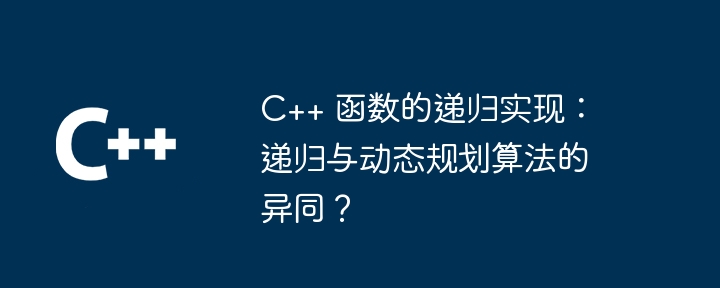
Recursion is a technology in which functions call themselves. The recursion keyword is used in C to define recursive functions. The syntax of the recursive function is: returnType functionName(parameters) { if (condition) { return result; } else { return functionName(newParameters); } }. Compared with the dynamic programming algorithm, the recursive algorithm is less efficient and requires larger memory. , while dynamic programming algorithms improve efficiency and reduce memory usage by storing intermediate results.

Recursive implementation of C function
What is recursion?
Recursion is a programming technique in which functions call themselves. Recursion occurs when a function calls itself.
Recursive implementation in C
In C, use the recursion keyword to define a recursive function. This keyword indicates that the function will call itself. The following is the general syntax of a recursive function:
returnType functionName(parameters) {
// ...
if (condition) {
return result;
} else {
return functionName(newParameters);
}
}Practical case: Factorial calculation
Calculating the factorial of an integer is a common recursive case. Factorial is a positive integer multiplied by the product of all positive integers less than or equal to it.
The following is a C function that uses recursion to calculate factorial:
int factorial(int n) {
if (n == 0) {
return 1;
} else {
return n * factorial(n - 1);
}
}Similarities and differences between recursion and dynamic programming algorithms
Both recursion and dynamic programming algorithms solve Common techniques for complex problems. The key differences between them are:
Conclusion
Recursion is a powerful tool, but use it wisely. For problems that require storing intermediate results or preventing stack overflow, dynamic programming algorithms are a better choice.
The above is the detailed content of Recursive implementation of C++ functions: What are the similarities and differences between recursion and dynamic programming algorithms?. For more information, please follow other related articles on the PHP Chinese website!
 What are the differences between c++ and c language
What are the differences between c++ and c language
 Recommended learning order for c++ and python
Recommended learning order for c++ and python
 Cost-effectiveness analysis of learning python and c++
Cost-effectiveness analysis of learning python and c++
 Is c language the same as c++?
Is c language the same as c++?
 Which is better to learn first, c language or c++?
Which is better to learn first, c language or c++?
 The difference and connection between c language and c++
The difference and connection between c language and c++
 C++ software Chinese change tutorial
C++ software Chinese change tutorial
 Cost-effectiveness analysis of learning python, java and c++
Cost-effectiveness analysis of learning python, java and c++




